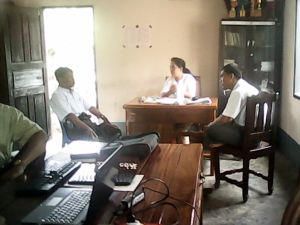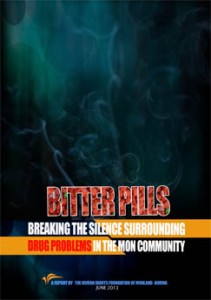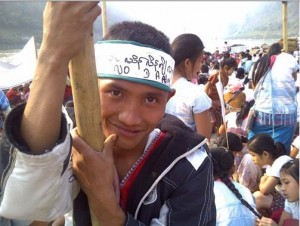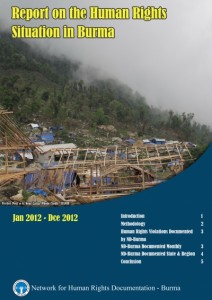Posts Tagged ‘Karen State’ (107 found)
New Report Documents Recent Violent Conflict in Karen State
New Report Documents Recent Violent Conflict in Karen State
More than 2,000 villagers were displaced in October as fighting resumed in Karen State, the site of the world’s longest-running civil war. A report released today by Karen Rivers Watch (KRW) reveals that the outbreak of fighting – after two years of ceasefire negotiations […]
Fortify Rights Briefing and Recommendations: November 6, 2014
In ongoing fighting in Kachin State and northern Shan State, the Myanmar Army has targeted and attacked civilians and non-military targets, and killed civilians with impunity.
For instance, in October 2011, the Myanmar Army entered Hka Wan Bang village, Kachin State following nearby clashes with the Kachin Independence Army (KIA). Soldiers detained and tortured three local men suspected of involvement with the KIA, two of whom spoke to Fortify Rights. Myanmar Army soldiers detained “Doi Seng,” a 27-year-old Kachin man, along with two other Kachin men and then shot and killed an unarmed Shan civilian man on a motorbike […]
• • •TPP Tax Payers Decry Unjust Taxation
 Last Saturday, Nov. 23, locals gathered in quarter 3 of Three Pagodas Pass (TPP) on the Thai-Burmese border to protest against alleged unjust taxation.
Last Saturday, Nov. 23, locals gathered in quarter 3 of Three Pagodas Pass (TPP) on the Thai-Burmese border to protest against alleged unjust taxation.
At around 9:00 AM more than 10 TPP tax-payers publicly opposed Daw San San Aye, the head of Kyarinnseikkyi township [Karen State] revenue department, as she was meeting with politicians, local authorities and quarter administrators […]
Message for International Day for the Elimination of Violence Against Women
On this day, 25th November 2013, the International Day for the Elimination of Violence against Women, KWO is launching a 16-Day Campaign calling for the elimination of violence against women. The awareness raising campaign will take place in the 7 Karen refugee camps and 5 districts inside Karen State. Participants will gain knowledge on how to prevent and stop violence against women, compete in speeches and debates, and participate in community activities aimed at advocating for the protection of women […]
• • •Cameron Should Demand Thein Sein Withdraw Soldiers From Ethnic States
Human rights training for Burmese Army won’t work
The Karen Community Association UK (KCA UK) today calls on Prime Minister David Cameron to press President Thein Sein to withdraw his soldiers from ethnic states to demonstrate he is genuine about wanting peace and improving human rights.
Despite a ceasefire agreement being reached between Thein Sein Government and the Karen National Union (KNU) in January 2012, human rights violations including force labour, arbitrary arrest, detention and land confiscation continue in Karen State […]
• • •Bitter Pills: Breaking the Silence Surrounding Drug Problems in the Mon Community
 In late 2012 the New Mon State Party (NMSP) initiated a vigorous anti-drugs campaign throughout various Mon communities in Burma. Arrests of numerous drug smugglers were made, drug-using youth were sent to NMSP rehabilitation centres, and signs were erected in villages calling on residents to resist and combat drug use. This wave of action brought an issue to the table that had thus far been surrounded by silence from relevant authorities. Prior to this, domestic and international discussions of Burma’s drug problems had largely been restricted to regions in Upper Burma, in particular Shan State. However, NMSP action highlighted that drugs were also prevalent in Mon communities and were being abused by Mon youth […]
In late 2012 the New Mon State Party (NMSP) initiated a vigorous anti-drugs campaign throughout various Mon communities in Burma. Arrests of numerous drug smugglers were made, drug-using youth were sent to NMSP rehabilitation centres, and signs were erected in villages calling on residents to resist and combat drug use. This wave of action brought an issue to the table that had thus far been surrounded by silence from relevant authorities. Prior to this, domestic and international discussions of Burma’s drug problems had largely been restricted to regions in Upper Burma, in particular Shan State. However, NMSP action highlighted that drugs were also prevalent in Mon communities and were being abused by Mon youth […]
New HURFOM Report Highlights Use and Trading of Drugs in the Mon Community
The Human Rights Foundation of Monland (HURFOM) released a report on drug problems in the Mon community, drawing on testimony from 140 individuals. The report aims to give a preliminary account of drug use and trading in Mon populations, exploring issues that range from the causes of rising youth drug use to the New Mon State Party’s (NMSP) recent anti-drugs campaign. HURFOM’s aim is to encourage a new focus on the issue, breaking a long-held silence to call for collaborative action from all relevant authorities […]
• • •Fate of Salween Dams Remains Unclear
 Some 2,000 internally displaced people and villagers from the Wei Gyi area gathered on March 14 by the Salween riverbank to protest continued plans to construct six hydroelectric dams on the river.
Some 2,000 internally displaced people and villagers from the Wei Gyi area gathered on March 14 by the Salween riverbank to protest continued plans to construct six hydroelectric dams on the river.
The ceremony, which included prayer services by a Buddhist monk and a Christian pastor, was also attended by community leaders from Dawei, who themselves are resisting massive development projects in their area […]
Losing Ground: Land Conflicts and Collective Action in Eastern Myanmar
Analysis of KHRG’s field information gathered between January 2011 and November 2012 in seven geographic research areas in eastern Myanmar indicates that natural resource extraction and development projects undertaken or facilitated by civil and military State authorities […]
• • •Report on the Human Rights Situation (January – December 2012)
 The annual report of Network for Human Rights Documentation – Burma (ND-Burma) documented the human rights situation in Burma from December 2011-January 2013. The report provides information on human rights violations (HRVs) over this period and highlights pressing issues and trends taking place in Burma. The annual report covers human rights violations in 16 categories over all 14 states. Unsurprisingly, the highest incidences of abuse occurred in ethnic nationality areas that remain in open conflict with the Burma Army, the Tatmawdaw, or are the grounds for controversial development projects […]
The annual report of Network for Human Rights Documentation – Burma (ND-Burma) documented the human rights situation in Burma from December 2011-January 2013. The report provides information on human rights violations (HRVs) over this period and highlights pressing issues and trends taking place in Burma. The annual report covers human rights violations in 16 categories over all 14 states. Unsurprisingly, the highest incidences of abuse occurred in ethnic nationality areas that remain in open conflict with the Burma Army, the Tatmawdaw, or are the grounds for controversial development projects […]









 All posts
All posts